Items
topic_interest is exactly
work
-
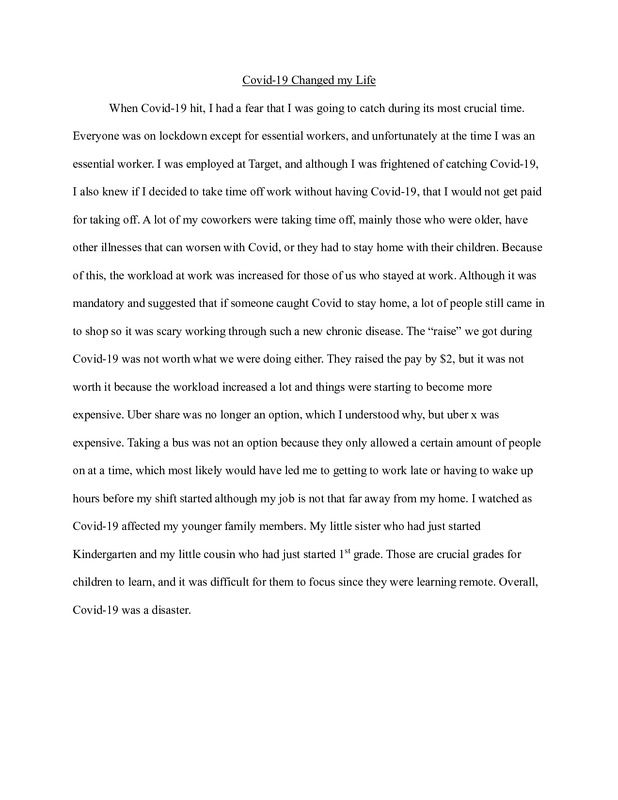 2019-09
2019-09Covid-19 Changed my Life
The item that I am a submitting is a short summary of my experience during Covid-19 -
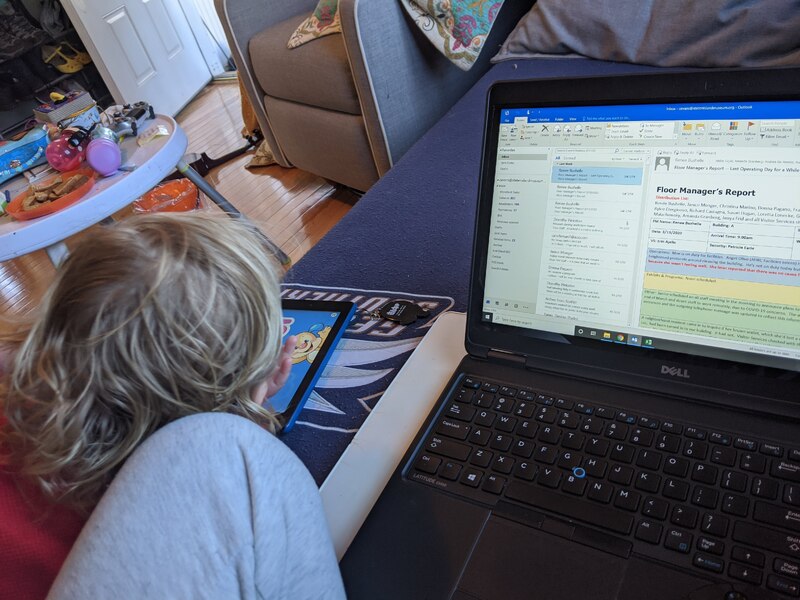 2020-03-16
2020-03-16A Year of Workspaces
When lockdown started, I was quarantining with my husband, our 2.5 year old daughter, and our elderly cat, Floofy. This series of images captures a year of my workspaces (March 16, 2020 to March 15, 2021). I worked all over our house. The living room when I was on kid duty. The porch when the weather was warm enough. A brand new desk when the porch got too hot. The bedroom when my husband, who had been laid of in March 2020, needed the desk to job hunt and eventually began doing off and on temporary work in December 2020. I returned to the office some of the time in September 2021. My husband is now fully employed again. Our daughter returned to pre-school in September 2020. Floofy died in January 2022. She had attended every work meeting with me. -
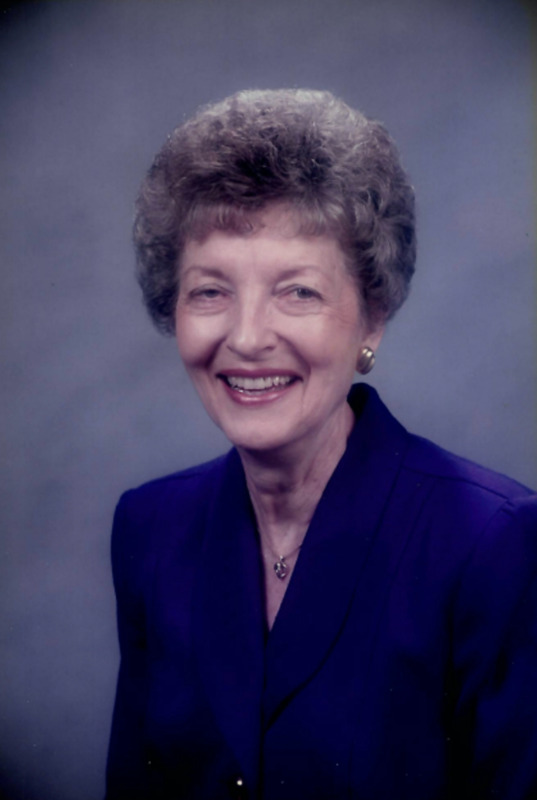 2022-07-02
2022-07-02Taking Care of My Grandma During COVID
This is a story of taking care of my grandma during COVID. A lot of the time I was employed as a caretaker for my grandma overlapped with the height of COVID. -
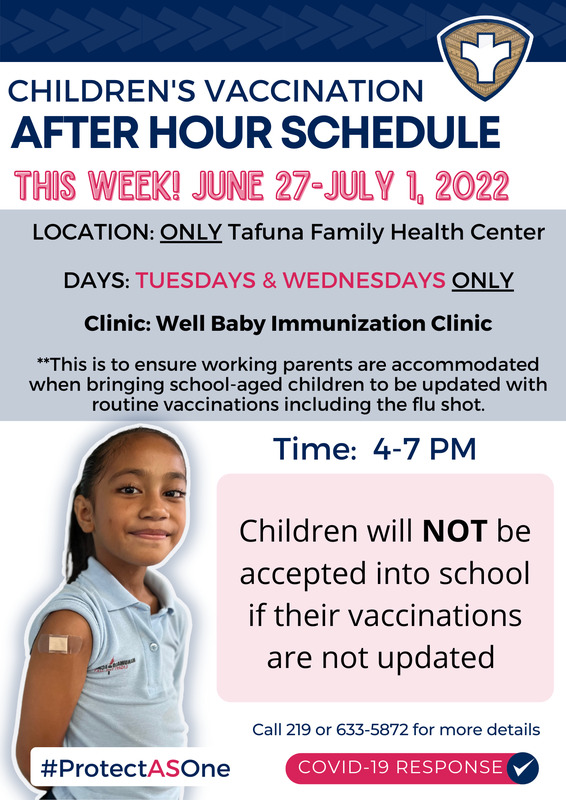 2022-06-27
2022-06-27American Samoa's Children Vaccination
With schools opening back up in American Samoa, children are required to get vaccinated. As the Department of Health points out that children will not be accepted into school if their vaccinations are not updated. The Department of Health has put out this flyer on June 26, 2012, for the public especially working parents to get their children's vaccination after hours from 4-7 pm on June 27 - July 1. -
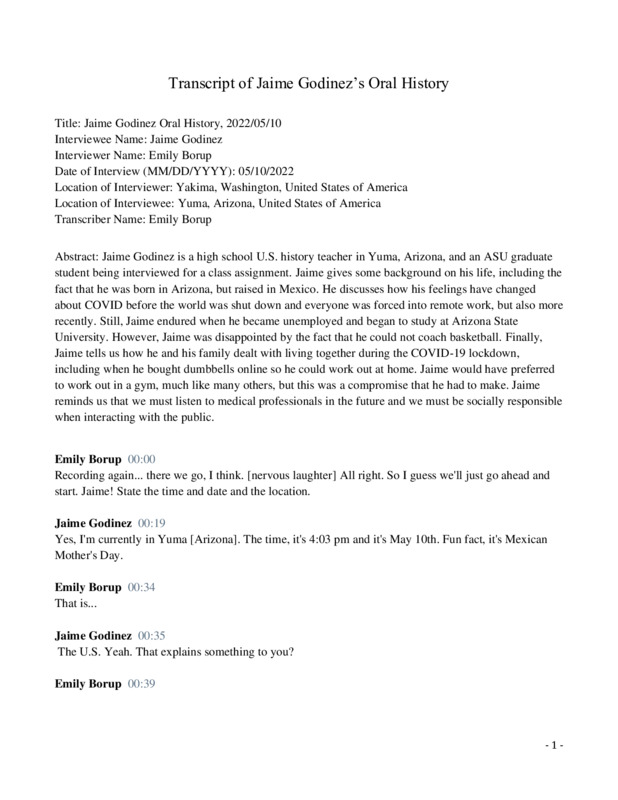 2022-05-10
2022-05-10Jaime J. Godinez Oral History, 2022/05/10
Jaime Godinez is a high school U.S. history teacher in Yuma, Arizona, and an ASU graduate student being interviewed for a class assignment. Jaime gives some background on his life, including the fact that he was born in Arizona, but raised in Mexico. He discusses how his feelings have changed about COVID before the world was shut down and everyone was forced into remote work, but also more recently. Still, Jaime endured when he became unemployed and began to study at Arizona State University. However, Jaime was disappointed by the fact that he could not coach basketball. Finally, Jaime tells us how he and his family dealt with living together during the COVID-19 lockdown, including when he bought dumbbells online so he could work out at home. Jaime would have preferred to work out in a gym, much like many others, but this was a compromise that he had to make. Jaime reminds us that we must listen to medical professionals in the future and we must be socially responsible when interacting with the public. -
2020-03-13
Living through A Pandemic
I can clearly remember when the pandemic began and as it progressed. I was in my senior year of high school. Before we understood the magnitude of what was going on there was a general consensus that it would be over in a few weeks. There is a culture with the media that trends only last a short time and we move on as a society. We all thought this would be another trend. A few months later and many things were still shut down. I finished school online and got my diploma in my car. We wore masks everywhere to stop the spread and everyone kept hand sanitizer on them. I also worked in food service at the time which was considered an essential business. We got extra pay and had extra precautions to follow. A few steps that were put into place were timers to wash hands at least once every 30 minutes. When masks started to be required they were sold out. I made a makeshift mask out of hair ties and a bandana. Soon Covid-19 tests became widely available and that created individual quarantines. People would test every time they came in contact. In the beginning, people were worried about paying their bills. Both of my parents owned small businesses. We had to sell our home to scrape by. As time passed the country made accommodations to open businesses up again. Two years later and we are still majorly affected. Now we are affected by product and labor shortages. Often grocery stores are out of certain products. However many businesses created contactless services such as grocery pick up, and delivery became more widely common. -
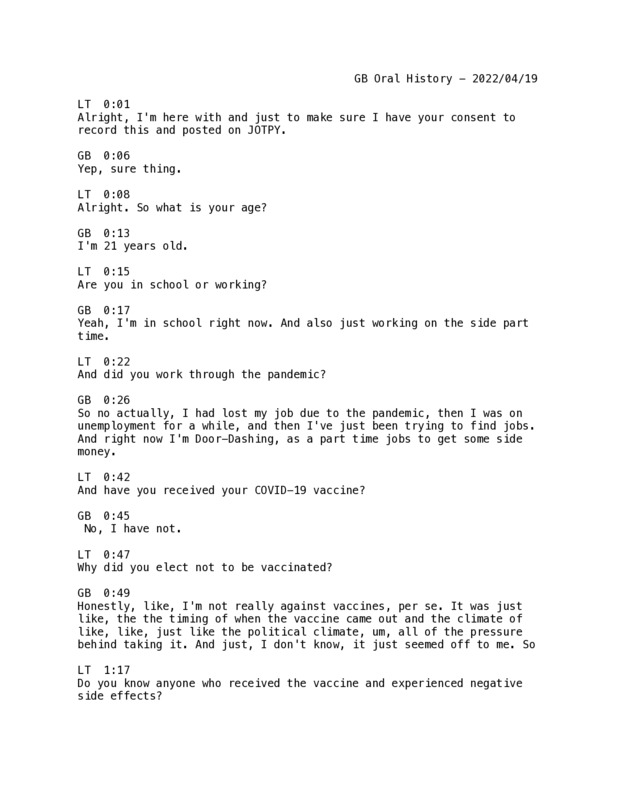 2022-04-19
2022-04-19GB Oral History, 2022/04/19
The interviewee discusses vaccine hesitancy and life during the pandemic without having received the vaccine. -
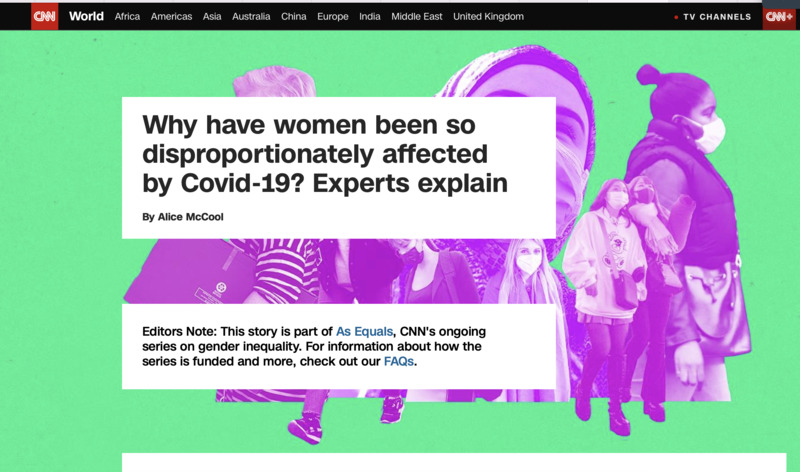 2022-03-10
2022-03-10Why have women been so disproportionately affected by Covid-19? Experts explain
This is a news story from CNN by Alice McCool. This story talks about the inequalities women have faced during COVID-19. In a CNN poll, women in the G7 countries (US, UK, France, Germany, Canada, Japan, and Italy) felt less supported by their leaders than men did. Some of these inequalities include women being more likely to lose their jobs or take on more uncompensated care work. Other things, such as abortion services, were considered non-essential in some countries during COVID. Minority women and poor women were also more likely to work low-paying jobs and bear much of the economic strain. Additionally, trans healthcare was also viewed as non-essential in many places. In places like Uganda, many women lost their safety net provided from schools, resulting in rising teen pregnancies and early marriages. This article continues showing more examples of the hoops women had to jump through compared to men and demonstrates the social issues that got worse as a result from COVID lockdowns. -
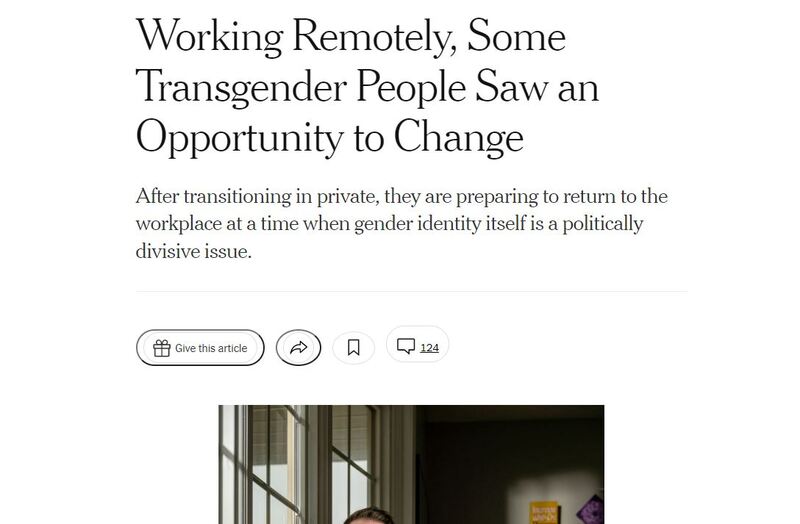 2022-03-17
2022-03-17Working Remotely, Some Transgender People Saw an Opportunity to Change
This is a news story from the New York Times by Jenny Gross and Alyssa Lukpat. This story is about people that have transitioned during COVID, or before that, and their work experiences. Some of the data present is interesting to look at. In 2021, healthcare providers reported a stronger demand for confirmation surgeries compared to 2020 when many elective surgeries were postponed. Though, demand was even higher in 2021 compared to 2019, before the pandemic. Some doctors say that this influx is partly due to surgeries being postponed, but there are other explanations. At Mount Sinai Hospital in New York City, the Center for Transgender medicine and surgery performed a total of 938 surgeries in 2021, 60 percent more than the previous year, and 43 percent higher than 2019. While there is this influx, the story links to a YouGov poll showing that many Americans are still divided on if others should be legally allowed to switch their sex. The article then goes on to discuss other inequalities trans people face, such as earning 32 percent less than the general population. Trans people are also twice as likely to be unemployed compared to the general population. Later on, there is a discussion on what trans people face in the workforce. Even in more liberal and progressive work environments, some trans people still report feeling unsafe working in person. There are complaints that diversity training in the workplace focuses mainly on gays, but glosses over trans people and their issues. Other trans people, like Rae Lee, fears she will be fired if she came out to public administrators. Working from home has allowed Rae Lee to feel safer. -
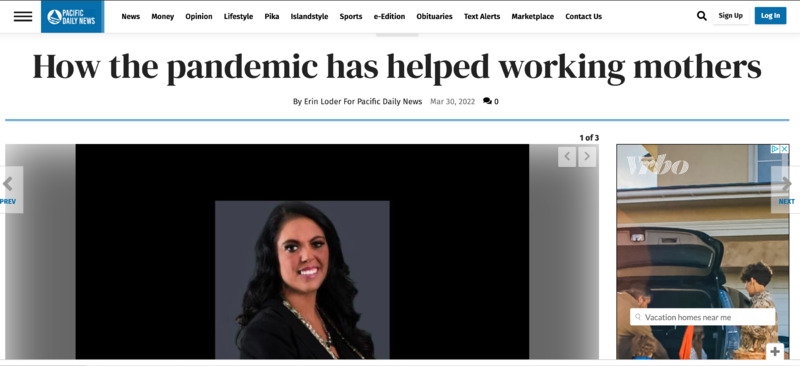 2022-03-31
2022-03-31How the Pandemic has Helped Working Mothers
This is an opinion piece by Erin Loder for the Pacific Daily News. This opinion piece details the benefits that COVID-19 has brought for working mothers. Loder, a working mother herself, describes having a more flexible schedule to help take care of kids. She says that in the workforce, women often get penalized for having kids much more often than men do, and with working from home, she is allowed to take more time for her kids and save money by not having to pay for daycare as often. Overall, she sees this as a positive turn for working mothers, since the pandemic has given women opportunities to raise their families more as they work. I found this opinion piece a nice take, as it brings out some of the positives women have experienced due to changes having to be made in work-life balance for many people out there. -
2022-03-24
High Functioning Autism during a Pandemic
For those that are somewhat familiar with autism, one might believe the pandemic was perfect for someone like me. People were encouraged not to speak to each other in person, everyone had to keep a distance, and masks were everywhere to conceal the face. These things, for me, were what I dreaded. I had a pretty good routine going before the pandemic. I had just graduated college with my bachelor degree and was getting used to being married. I was also caring for my grandma as one of my first jobs. I got to get up every morning, earn money, and make sure my husband was well cared for. My husband and I would go places for date nights and we would sometimes do spontaneous things like midnight grocery shopping for ice cream. Things were just carefree. Then a few months into our marriage, things changed a lot (more for me than for my husband). I enjoyed going to church in person for both my spiritual needs and for the social aspects it gave me. Once March 2020 happened, I couldn't go to church in person. Church was online and it became harder for me to get into it and actually concentrate. I then just stopped going altogether for a while because I wanted to have that human connection I was missing. Eventually, I was able to go to church again, but I had to wear a mask. I dealt with it even though I didn't like it. It was sad to see so many people's faces covered by cloth. It made it feel like I couldn't connect to people as well. My social skills aren't terrible if everyone wears a mask, but I'm more likely to miss certain cues or tell when someone is joking. I focus on the mouth a lot when people talk, so not getting to see mouths was bothersome. Other elements of my life changed, and autism made it worse for me in some ways. Due to my older habits of wanting to go places more often, the stay-at-home orders that occurred at the very beginning made me feel like a prisoner and that I couldn't choose things for myself as often. This increased my anxiety a lot, to a point of a mental breakdown. My husband was luckily very understanding of my issues, so I was eventually able to recover once I gave myself more work to occupy my time with. Of all the COVID rules I had to follow, social distancing was one of the easiest things for me, but only in a few ways. I was fine with talking in person from a distance, as I already do that naturally, but I was not okay with having to talk to people more often through online video like Zoom. Zoom feels so unnatural because seeing people through video is not the same as seeing them in person. I didn't have to do it very often, but I was greatly unhappy at the annual family Christmas celebration in 2020 was all on Zoom. It didn't feel as festive as I would have wished. Autism in general has made COVID much harder to deal with, and sometimes I think that if I didn't have it that I could have adjusted better to the abrupt changes COVID brought into my life. I did learn some things though. I learned that I need a set routine to get things done, and that if I have a problem, I shouldn't feel afraid to be more honest about it. With my husband having had to work from home due to COVID, both of us have had to work on better communication skills. I don't think everything I've learned from this experience has been bad, but it's also not something I want to go through again. -
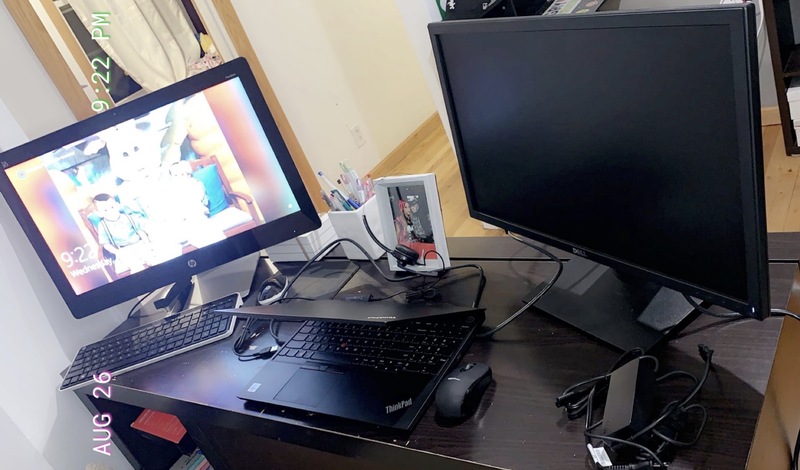 2020-08-26
2020-08-26Working From Home
When my son started Kindergarten remotely in August of 2020, I was required to work remotely for the first time ever. It was the hardest year for both myself and my son. Being that it was his first school year, I needed to split my time between fulfilling my job requirements and helping him learn how to use the computer properly. -
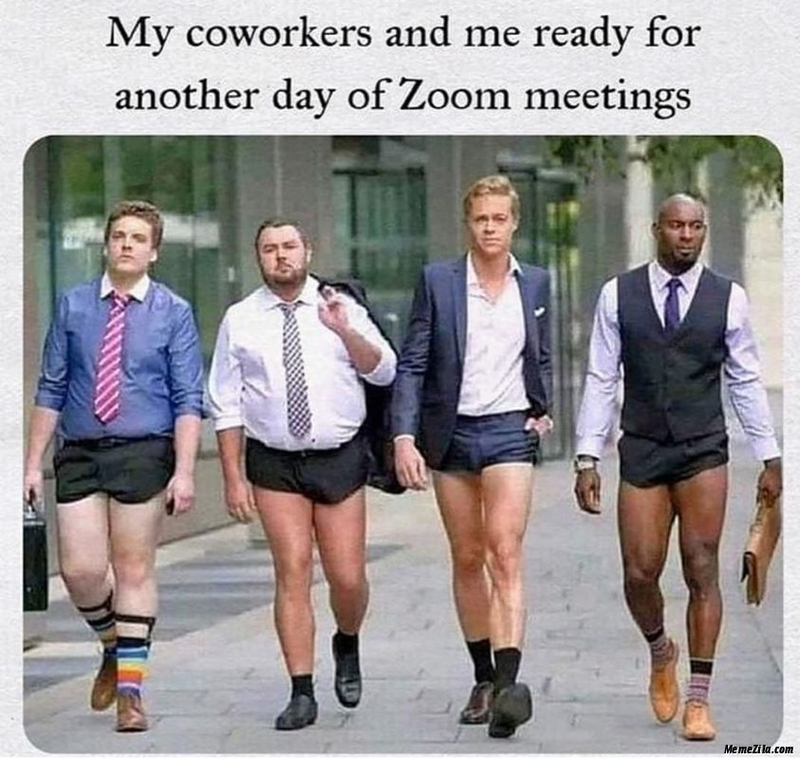 2020-04-01
2020-04-01Zoom Meeting Fashion
What's been your pandemic work attire? It's gotten much comfier these days when you're only having to be seen from the chest up. -
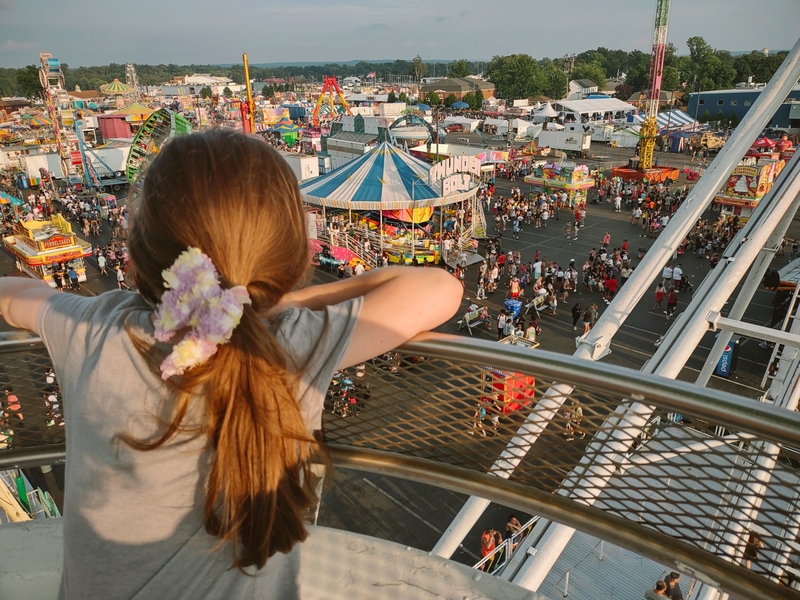 2021-10-06
2021-10-06Reflecting on life. Life has been hard.
It was August 25th, 2019. I had finally reached my parents’ house, all of our belongings* (all that could fit in one car*) in tow, back in my home state of New York. I didn’t want to be here – I grew up in NY, and until two years ago, never intended on coming back. I like to call it the “tectonic plates of life” moving, that moment when you feel something big on the horizon and suddenly, oh hey, here’s a big life decision you didn’t plan on having to make, have fun! Circumstances change, yeah. Life is a pretty unpredictable time warp, and global warming is such a serious issue; it was already sorta tough to not focus on the negatives before 2020. Relationship issues, financial issues, family issues – so many volumes of problems. I already felt like I had lost everything, pride included. Nothing could have prepared me for the pure stress that inevitably comes from a worldwide pandemic. Moving back into my parents’ house as a single parent in her 30’s was just about the biggest pill I could swallow that autumn. Since I had decided to work at Starbucks again, I finally made up my mind to go to college for the first time. In February, I enrolled in summer classes to start at ASU. I was hearing something about a coronavirus, but I wasn’t paying much attention to the news with taking placement tests for college in between working. In March, my daughter’s school closed, and so did Starbucks. It’s hard. It’s hard to not focus on the bad, and it’s so odd to think fondly of the not-so-bad before it. Life just feels a little bit harder. A lot bit, with the increasing violence, hatred and misinformation being spread on a daily basis. Everyone’s experiencing repercussions in one way or another; but something I cannot deny – the something I’m most grateful for: how much I’ve grown, emotionally and mentally. Maybe I can’t credit the stress from the pandemic completely, but it has certainly put all of my other stress in a different perspective. It turned my attention to world issues – I stopped being so wrapped up with myself and my own country, started learning about other cultures after starting college – falling so deeply for that education that I decided to major in Anthropology, with a Minor in Religious Studies. I watched a Ted Talk once that described the good effects of stress.. I feel as if I’m a better human, or at least, a more knowledgeable one. A lot has changed in the past two years. I started college, moved into my own place, moved back into parents’ (hi, tectonic plates!), went from being faithfully Christian to super agnostic/atheist (that was mentally difficult and I’m still processing it) and although I am quite bitter with life in general, I’m also much happier with it, and with myself. I'm a better mom for it. Life has felt like a constant challenge for years now, but I appreciate how easy it is to appreciate the simple things. I may find it annoying that everyone is more on edge, but honestly, who can blame them? Good on everyone for putting up with life! All we can do is learn and grow. And treat the planet well, guys. Let’s do that, too. -
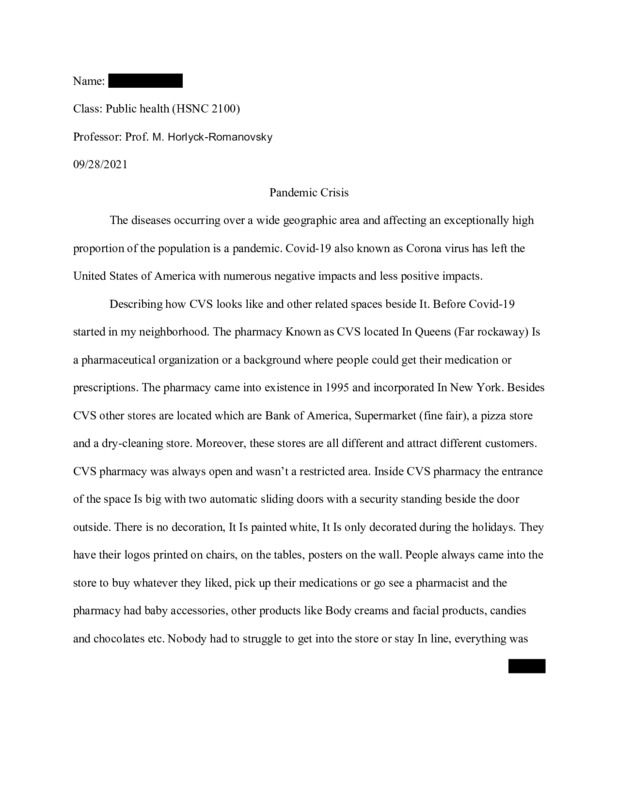 2020-04-24
2020-04-24My story is about the pandemic crisis when it started in 2020 I based it particularly on my area where I live.
The pandemic crisis about COVID-19 and how it affected everyone. -
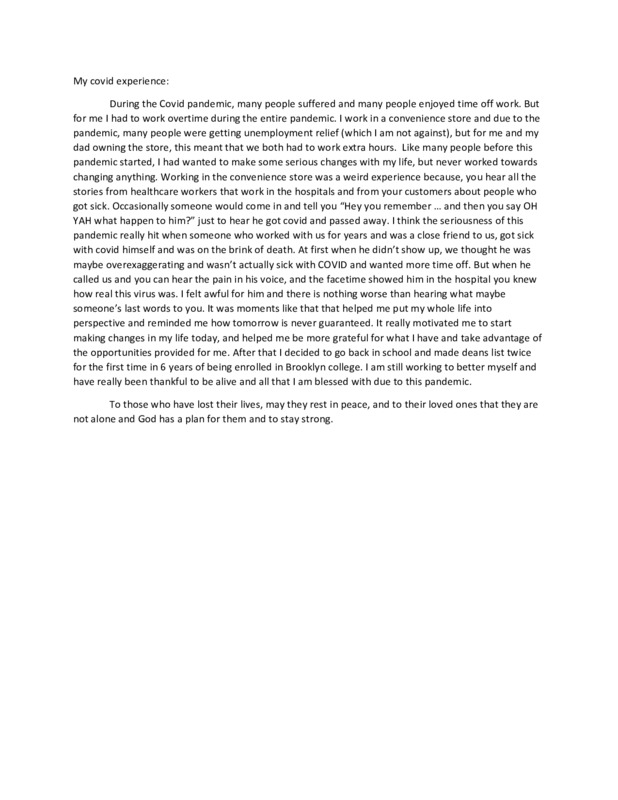 2020-06-06
2020-06-06One essential workers perspective during the covid pandemic
This was my experience as an essential worker during the Covid pandemic. -
2020
Finding Time
Over the last five or so years, I've been dreaming about some event that would stir up some excitement in New York City, preferably some good event, but an event nonetheless. Never did I dream that it would actually come true, unfortunately in the form of a worldwide pandemic. Why couldn't it be something more fun, like aliens (although it seems like we might be getting there)? While the pandemic didn't bring anything exciting per se, it brought some change with it. When it began to be taken more seriously last year (2020), when all the shutdowns began to occur, I saw a major change in my day to day life. From being laid off of work, not being able to go to classes in-person anymore, and not being able to see any friends in person either, the normal, repetitive life that I had gotten so used to had disintegrated within just a couple weeks, if not shorter. It forced me to look at things in a different light, and as I was forced to be by myself for most of it, as we all were, I felt as if I needed to find some positivity and motivation in the few things I could do and had control over. I finally had time to focus on myself and made sure things like my physical/mental health and education were a priority. I took up cycling, as it was one way for me to be active and remain safe because it's not really something you need to do with others, and that opened the world up to me, especially with how empty the city was. Even my quiet pocket of Queens got quieter as barely anyone was outside, so while it did feel a bit post-apocalyptic out sometimes, it also gave me a sense of peace and freedom. Also, with having so much more time at home and not having to commute, I took advantage of online-learning to really give myself as much time as I needed, instead of the previous sense of rush and urgency I used to feel when it came to assignments, and actually turned my grades around pretty drastically. While the pandemic has been horrific on most fronts, by working my hardest to make the best of it, I've been able to better myself as it's given me time to enact real self-care. Something I've never taken the time to do before. -
2020-04-16
Happy Birthday...
Today is April 16th, 2020. Instead of waking my mom up with breakfast in bed, she sends me a photo of herself layered in protective gear. At the time my mother was working at one of the largest hospitals in Queens. She went from working four days a week to working six-seven days a week as the rates of COVID-19 hospitalizations increased. Today is her birthday and instead of celebrating life, she is surrounded by fear, death, and uncertainty. Thank you Mom for being strong and putting your life at risk as an essential worker. Happy Birthday -
2020-03-15
Corona virus 2020
During the beginning of 2020 everything seemed so fine. I was in school had started a new job at a plumbing company, was occasionally going out with my girlfriend. On top of making money, going to school, i was also hitting a gym and was super happy with my progress in every aspect of my life. All of this was good until, news about how a deadly virus was making its way into the United states from china and how bad it was going to be. Like everyone else i was petrified and i thought there's no way china would let a virus escape they're a powerhouse of a nation. But it did, I remember classes were shut down and shortly after my job was shut down as well, everyone, put in unemployment. During this time my parents had closed on a house and we had become homeowners. During quarantine i remember having to go to our new home and fixing it up everyday monday through sunday so while everyone was at home, doing nothing. My uncles, cousins, father and i were masked up just working in our home. But no matter how far apart we were on different floors and different days, we all got sick. We all also quickly recovered. The covid 19 pandemic didnt have a huge impact on me as much as it did for others. I know a lot of people close to me who lost their loved ones during the pandemic and its truly saddening. My progress with my daily life was lost, school that semester felt like a blur everyone was confused and scared, the gyms were closed, my jobs were closed. I remember hating my life at this moment in time because it felt like i wasn't doing anything but fixing our new family home which i wasn't eager to move in to. Once my jobs lifted in the beginning of june, i quickly picked up my tools and went back into work. -
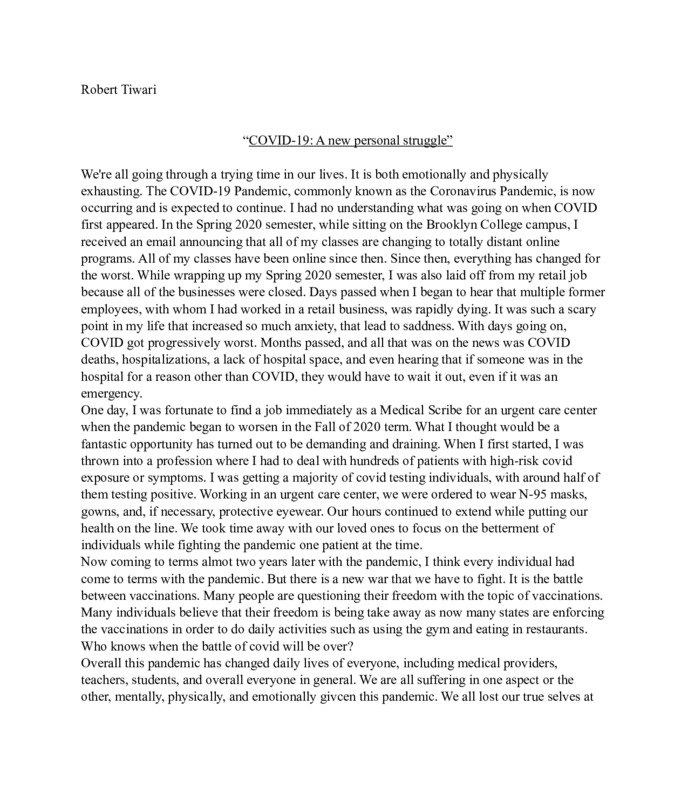 2021-09-30
2021-09-30COVID-19: A new personal struggle
My experience has changed overall with this pandemic. In my paper I discussed the different aspects of how my life changed given the circumstances with work, school, and personal lifestyle. -
2020-03-16
My life with COVID
The COVID pandemic has affected everyone around the world. Going into march of 2020, I had a lot of pressure put on me by my parents to either quit my job, or take time off because they didn't know how serious the virus was and wanted me to take no chances. I also have an autistic brother who cannot speak so I didn't want to risk giving COVID to him. At the time, nobody knew how severe the virus was, but as time passed I witnessed first hand how serious it was. When I got back to work after taking time off, I saw what I thought was a joke. Shelves of foods completely empty, and all toilet paper sold out as well other cleaning products. This went on for about a month before people stopped buying a lot of things in fear. There would be lines outside of my job because too many people were coming and we didn't want to have a lot of people gathered in one place for safety reasons. More time passed and things sort of went back to normal but people now wore masks and practiced social distancing. Now over a year later, things are more calm and people are finally doing the right thing and wearing masks to prevent the spread of the virus and end this pandemic. -
2021-07-12
Working during the Covid-19 Pandemic
I took a summer job in this pandemic working at a summer camp with young children. At first, I was skeptical because of the times we’re living in, and because kids just have poor habits that can cause the COVID-19 virus or any bacteria to spread. But then I just did it because it beats staying at home all day. There were many safety precautions and guidelines that took place to keep everyone safe and healthy. Any sick kids or staff were sent home and couldn’t come back until they were better. In addition, we had to check our temperatures every day, the staff had to fill out daily health surveys before arrival, we always had to have our masks on, disinfect each classroom after we use it, and wash our hands frequently. We went by a schedule, so there wouldn't be any confusion or unnecessary crowds. In terms of safety, the summer camp did a good job keeping everyone protected from the COVID-19 virus or any other sickness. Overall, the experience was different than the regular summer camp because we couldn’t do as much. But we made the best of it for both the staff and children. -
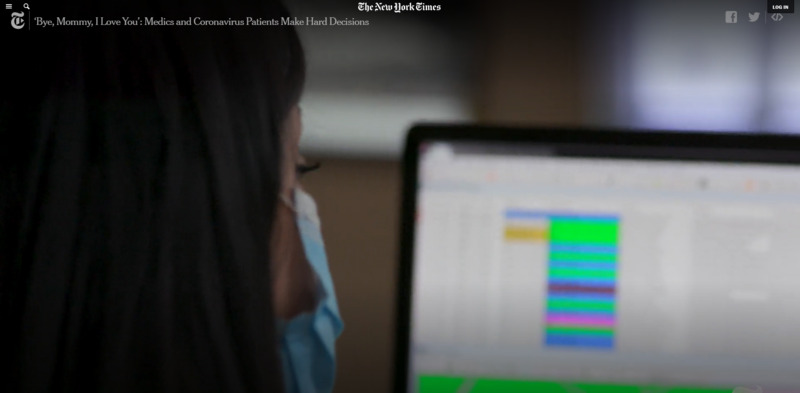 2020-05-01
2020-05-01The start of a pandemic that shock the medical field to its core
I have worked as a NYC paramedic for several years before the pandemic Covid-19 hit the world. As a paramedic, we were trained to deal with most situations that would happen on an emergency basis. We dealt with any situation as simple as a cut on the arm, to as complex as running a mega code on a cardiac arrest patient. When Covid-19 hit NYC, I was unaware of how bad it was going to get. At first, we thought it was a virus that was weaker than influenza, which is something we deal with on a regular basis. At this time, we would get one call a day that was related to Covid-19. I thought that everyone was over exaggerating. Over time, Covid-19 patients became more frequent, and in the matter of a month, it was the only type of call we would get. It was as if every other medical problem that people had went away. But this was because everyone that wasn't infected with Covid-19 was too afraid to go to the hospital. In the month of May 2020, things started to take a turn for the worst. People were starting to get critical on each call, where my partner and I would need to resort to extreme measures like endotracheal Intubation to help them breath. Sometimes, even intubation wouldn’t be enough, and the patient would go into cardiac arrest from the lack of oxygen in the body. It was a very difficult time for me because I felt powerless to stop people from dying to his terrible disease. In June 2020, it got so bad that the hospitals did not have capacity to accept anymore patients that came in. People were put in hallways, next to nursing stations, and hospitals had to dedicate entire floors to Covid-19 patients as they came in. Then another problem started to rear its head. My Co-workers and friends started to get sick. Those of us with families had to also make a choice, either quit their job to protect their families or live apart from them until this was all over. We did not have enough EMT’s and Paramedics to staff the ambulances we had running on any given day. Those of us who were not sick picked up anywhere from 60-90 hours a week. This struggle continues now as well. All over the world, there are not enough emergency services personal to cope with the amount of call volume that we are given each day. Over time we got adjusted to the madness and medicine advanced enough to be able to treat patients so that most did not become critical. Also, the vaccine was made available to the public and things started to get better. I shared my story to show a side of the pandemic most don’t get to experience. It shows how unprepared we were, and how we were able to prevail overtime. I will also include a video to show some insight on the pandemic that was taken with one of the companies I work with. -
2020-12-09
Life in the Pandemic
My life in the pandemic was tough. I couldn't work so I was not able to pay my bills, I like the rest of the world during lockdown had to sit at home bored out of my mind because nobody could leave. I was very scared for my mom when she got covid because she had oxygen issues and also heart issues. Going to school during the pandemic really bothered me because I lost a lot of focus and became very lazy when it came to handing in assignments. I would rather physically go onto campus because when I am actually listening to the professors' talk, it makes it so much easier to understand and to focus. -
2020-02-05
Dancing through the Pandemic
I have never experienced a pandemic like COVID-19, most of us have not. When we were told to stay home, quarantine and social distance life just became static. I moved into somewhat of a virtual reality, taking online classes and working from home. However, being home everyday without any socializing or going to the gym became really depressing and I had a hard time focusing on my work. One day my sister and I were sitting on the couch, over with pandemic life and she says "let's have a dance party". We blasted music throughout our apartment for hours and just danced all the pressure and stress out. We did this at least 3 times a week for months during the most difficult times of the pandemic. It became something we looked forward to. It was the best decision we have ever made. Not only could we destress but we had the time of our lives and it brought us closer as a family. -
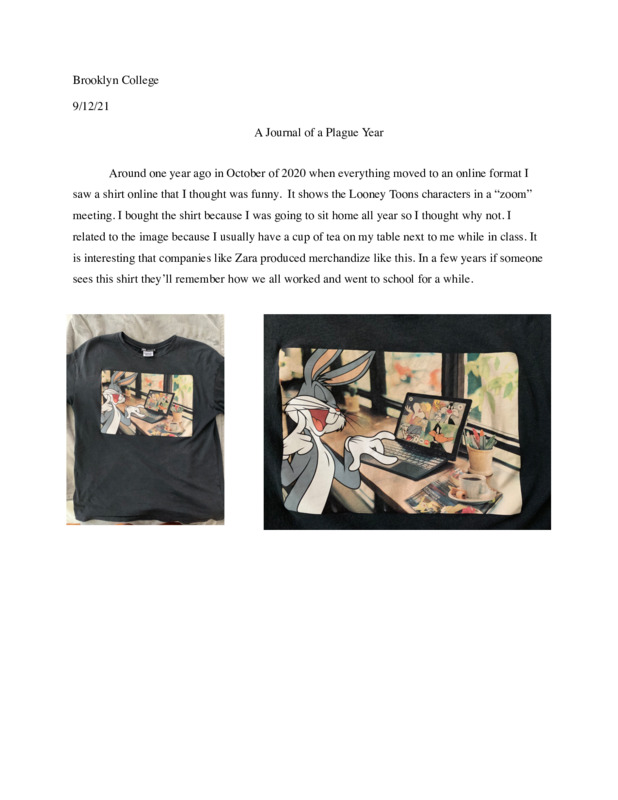 2020-10
2020-10A Journal of a Plague Year
The object I am uploading shows us how fashion is also impacted by Covid, it is really interesting. -
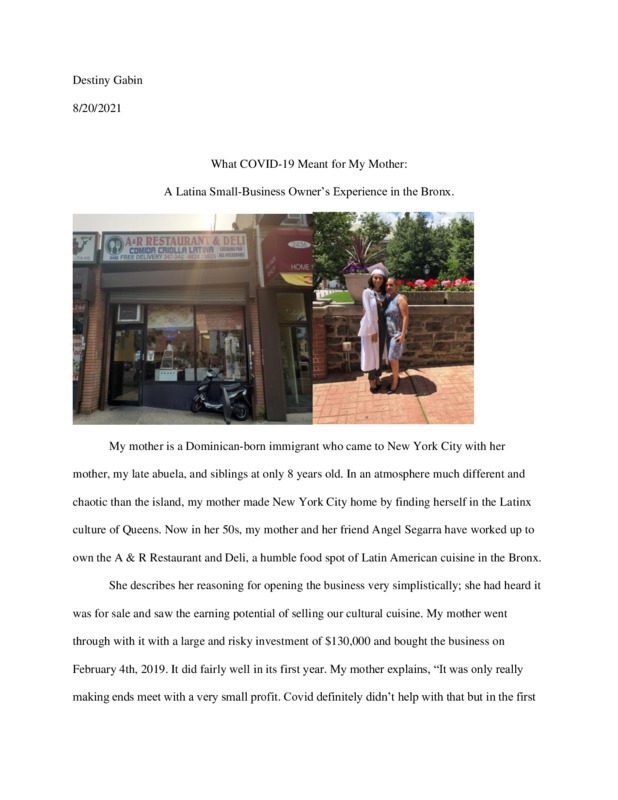 2021-08-22
2021-08-22What COVID-19 Meant for My Mother: A Latina Small-Business Owner’s Experience in the Bronx.
The item I am submitting is a pandemic auto-ethnography detailing the disproportionately negative impact of COVID-19 on Latinx businesses. I do so through the narrative of my own family's experience, specifically my mother, as well as supporting academic research of general demographic trends. This piece speaks to how the pandemic, while in and of itself does not discriminate, has proportions of its impact that demonstrate a systemic bias leaving certain racial and ethnic groups less protected and far more targeted than others. The piece also connects how these discrepancies are not products of the pandemic, but rather were already systemically there and exacerbated by the pandemic. -
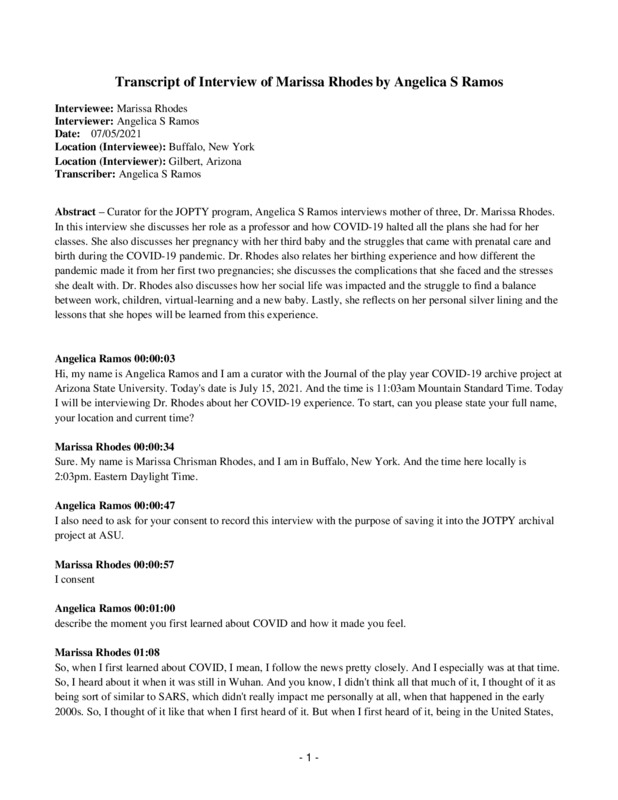 2021-07-15
2021-07-15Dr. Marissa Rhodes, Oral History, July 15, 2021
Curator for the JOPTY program, Angelica S Ramos interviews mother of three, Dr. Marissa Rhodes. In this interview she discusses her role as a professor and how COVID-19 halted all the plans she had for her classes. She also discusses her pregnancy with her third baby and the struggles that came with prenatal care and birth during the COVID-19 pandemic. Dr. Rhodes also relates her birthing experience and how different the pandemic made it from her first two pregnancies; she discusses the complications that she faced and the stresses she dealt with. Dr. Rhodes also discusses how her social life was impacted and the struggle to find a balance between work, children, virtual-learning and a new baby. Lastly, she reflects on her personal silver lining and the lessons that she hopes will be learned from this experience. -
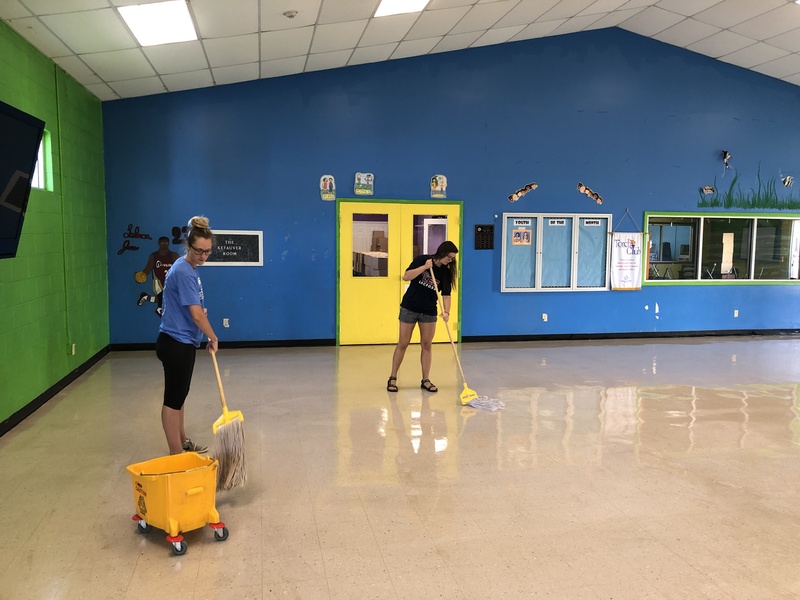 2021-07-02
2021-07-02No kids in the hallways
I work as a director of a Boys & Girls Club in Cleveland, Tennessee. For anyone unfamiliar with the Boys & Girls Club, we are a Department of Education-certified after-school and summer program. Our organization is comprised of fourteen Clubs across four counties and, prior to COVID-19, we served over 1,000 Club members every day. Immediately following the outbreak of COVID-19, the hallways of our Clubs were empty. In a matter of hours, an invaluable local resource became inaccessible to hundreds of families who depended on our support. This was an extremely difficult time. Fortunately, our organization has an exceptional leadership team. From the moment our doors closed in March 2020, our administration began working around the clock to adapt our program into one that was both virtual and accessible. Clubs began having daily ZOOM calls with their members, calling families to just check in, making silly YouTube videos and connecting with teen members on safe and secure social media platforms. Even further, our administration ensured that no one was laid off and employees still had plenty of work to do. With our hallways emptied, we were divided into small teams that could easily work in a socially-distanced manner and were assigned to a number of facility maintenance projects. We knew that one day our Club members would return, and when they did, we wanted their Clubs to be fresh, clean, and updated. I was assigned to the floors team. This team was charged with stripping and waxing all of the floors in each of the fourteen Clubs. For about eight weeks straight, I became overly familiar with the burning, sterile scent of Zep Heavy Duty Floor Products. Even with an industrial mask, the sharp and bitter aroma of the cleaner was pungent. Now, anytime the floors need to be done in my own building, I am taken back to those 14 weeks there were no kids in the hallways. Fortunately, we re-opened our doors to our Club members on June 1st, 2020 with strict health and safety protocols, and only at half capacity. We remained at half capacity until June 1st, 2021 when we were finally able to fully re-open our sites. Our numbers have still not returned to what they were, but we are slowly getting there. The important thing to us is that we are able to safely provide much-needed services to our community. -
 2021-05-08
2021-05-08US dog shelters struggle with returns after pandemic adoption boom - BBC News
This story from the BBC talks about how many dogs adopted during the pandemic are being returned to shelters once life returns to normal. Some adopters did not think ahead or understand all the implications of pet ownership. This is a traumatic experience for these poor animals. Also fewer dogs were neutered/spayed during the pandemic, so there is an uptick in the number of puppies needing homes. -
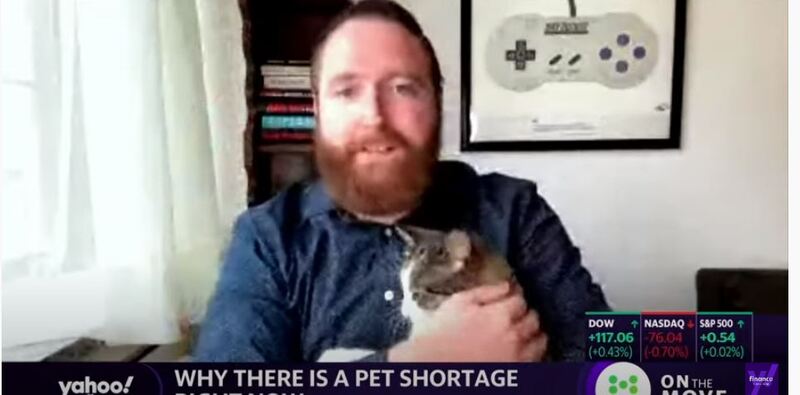 2020-09-12
2020-09-12Coronavirus and pets: How the COVID-19 pandemic has sparked an increase in pet adoption
This video talks about the shortage of available dogs for adoption in the United States during the pandemic. It describes the huge demand in the North East, California, etc. but packed shelters in the South. This is a trend that started long before the pandemic. Southern shelters are shipping dogs to shelters in the North for adoption. Millenials and Gen Z people want more pets and are willing to spend more money on their pets. This trend is expected to continue after the pandemic as more people negotiate with their employers to have non-traditional or hybrid work models. -
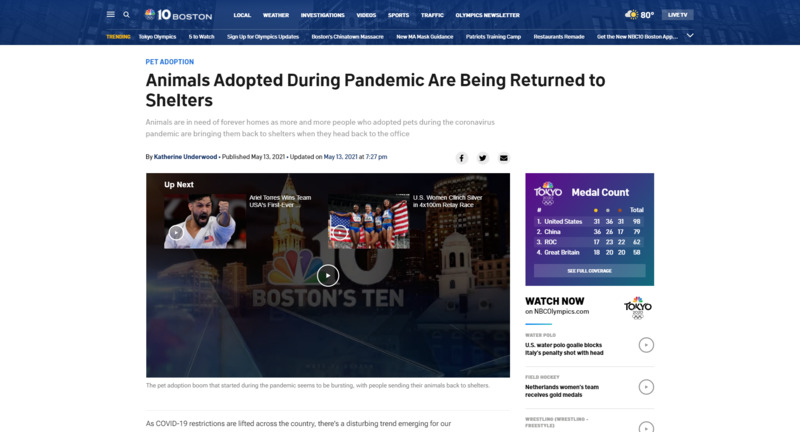 2021-05-13
2021-05-13Pandemic Pets Return to Shelters
Sadly, as the nation returns to work and activities, pets adopted during the pandemic are paying the price. According to the article, owner surrenders are up more than 80% from this time last year. People did not think far enough ahead about what would happen once the pandemic was over. Now its the poor animals who have to pay the price. When will people learn that animals are not toys to be thrown away when it becomes inconvenient? -
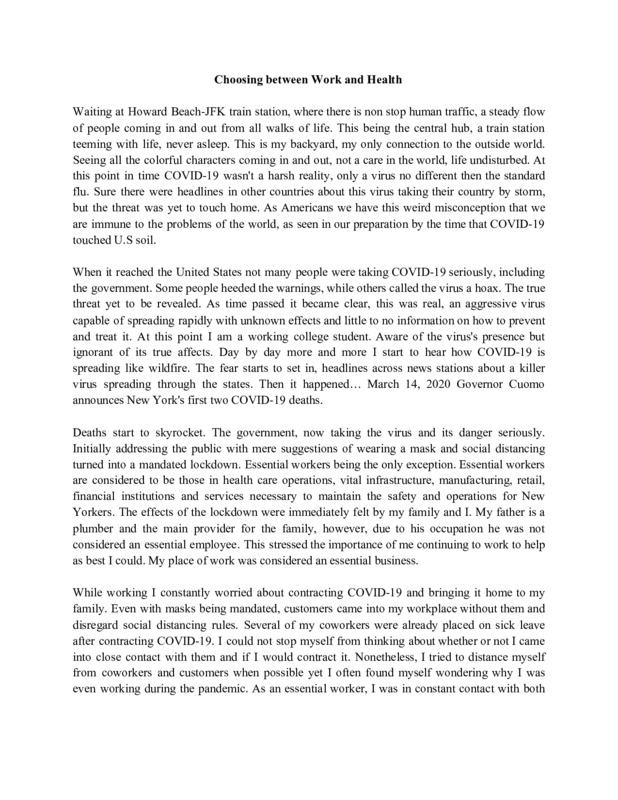 2021-03-26
2021-03-26Choosing between Work and Health
This short piece shares the struggles and experiences of choosing between working as an essential worker and worrying about my family's health during the peak of the pandemic. -
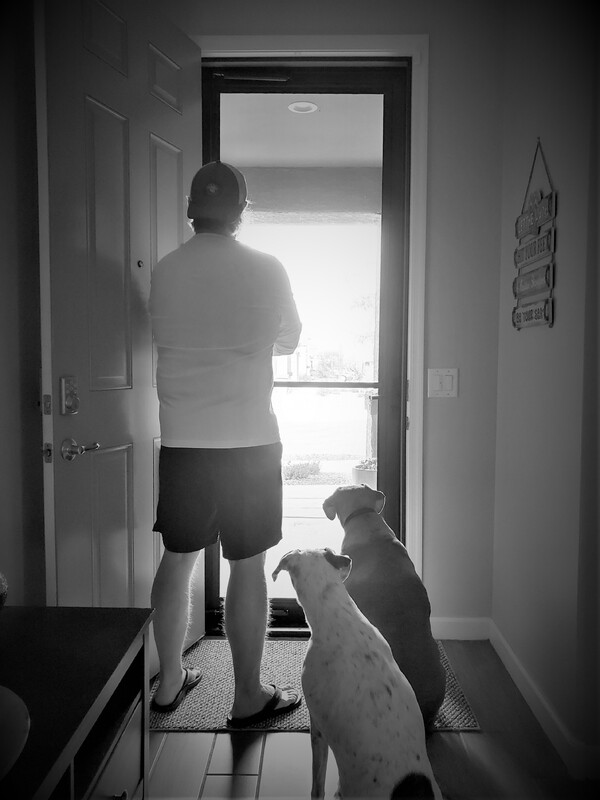 2021-04-21
2021-04-21James Rayroux's JOTPY Portfolio
--Reflections on the Pandemic Archive-- Looking back over my experience with the “Journal of the Plague Year” COVID-19 archive, my prevailing emotion is gratitude. This opportunity granted me experience that few historians earn, and the remote, asynchronous work schedule allowed me to collaborate with my colleagues in ways that maximized our respective contributions. The breadth and depth of our individual experiences and perspectives tremendously improved our collective process and products. I spent enough time in the Arizona State Archives last year to recognize such collections as historical treasure chests, but I have now participated in processing an archive’s content and navigating the ethical dilemmas those submissions sometimes create. Archivists and curators are the history profession’s truly unsung heroes, and their work facilitates society’s perception of itself. My background in police work and public safety drew me to the archive’s existing Law Enforcement collection. In taking on that subset, I succeeded in reshaping the collection’s parameters to now include stories about police and law enforcement. I wanted to diversify the collection to encompass perspective of both the police and the public with whom they interact and serve. While some overlap exists between the Law Enforcement and Social Justice collections, each remains distinct. Through my contacts and writing, I promoted a Call for Submissions to an international audience of law enforcement professionals to reduce their relative silence within the archive. Within the archive’s content, I recognized that one’s location might shape their pandemic experience, and I created and designed an Arizona-based exhibit to explore that. Further research and discussion with my mentors and colleagues ensured the exhibit illustrated these differences without excluding visitors whose diverse experiences could further enrich the archived and exhibited content. I am proud of my “Arizona’s COVID-19 Pandemics” exhibit, particularly because of its compressed, one-month incubation period. Beyond displaying images, data, and stories representative of the diverse pandemic experiences within the state, the ACP exhibit offers visitors numerous levels of interaction and engagement to became active participants and create their own exhibit experience. Visitors can complete opinion surveys, add a story to the archive, explore additional content related to the displayed pieces, view ever-changing results from pre-defined archival content searches, conduct their own archival search, view collective visitor survey results, and apply to join the staff. The exhibit’s searches will include the archive’s future submissions, which reshapes both the exhibit and the experience visitors may have with it. A more detailed explanation of my ACP exhibit may be reviewed here: https://covid-19archive.org/s/archive/item/43037 Because of Dr. Kathleen Kole de Peralta and Dr. Mark Tebeau, I stand prepared to join research, curation, and exhibition teams and immediately contribute to their work products. Despite my gratitude for this experience and the opportunities it presented, I look forward to the day COVID-19 is no longer part of humanity’s daily vernacular. James Rayroux 22 April 2021 -
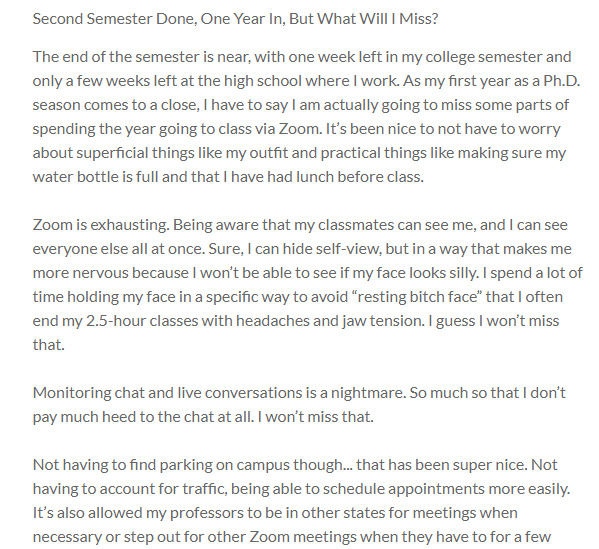 2021-04-15
2021-04-15Second Semester Done, One Year In, But What Will I Miss?
The end of the semester is near, with one week left in my college semester and only a few weeks left at the high school where I work. As my first year as a Ph.D. season comes to a close, I have to say I am actually going to miss some parts of spending the year going to class via Zoom. It’s been nice to not have to worry about superficial things like my outfit and practical things like making sure my water bottle is full and that I have had lunch before class. Zoom is exhausting. Being aware that my classmates can see me, and I can see everyone else all at once. Sure, I can hide self-view, but in a way that makes me more nervous because I won’t be able to see if my face looks silly. I spend a lot of time holding my face in a specific way to avoid “resting bitch face” that I often end my 2.5-hour classes with headaches and jaw tension. I guess I won’t miss that. Monitoring chat and live conversations is a nightmare. So much so that I don’t pay much heed to the chat at all. I won’t miss that. Not having to find parking on campus though... that has been super nice. Not having to account for traffic, being able to schedule appointments more easily. It’s also allowed my professors to be in other states for meetings when necessary or step out for other Zoom meetings when they have to for a few minutes and then return. I guess it is what we have been saying for the better part of nine months now, that we have always had the ability to be flexible, just no willpower, and the pandemic has shown us that we really can be flexible. Selfishly it makes it easier to work and go to school as well. I haven’t missed a single class all year. It made being a TA easier too, since I didn’t have to go to campus for those classes either, which would have further complicated a work schedule. I am ready to go back to school, after three online master’s degree, the perpetual student in me was so excited to go back to campus for classes and be a part of a college campus again and I didn’t get that because of the pandemic, but I think in some ways it made the transition easier for me. It made it easier for me to feel like I could do it all at once. -
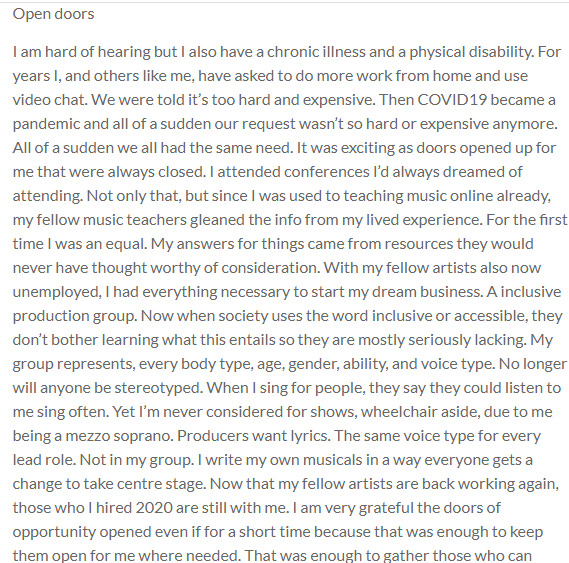 2021-04-06
2021-04-06Open doors
I am hard of hearing but I also have a chronic illness and a physical disability. For years I, and others like me, have asked to do more work from home and use video chat. We were told it’s too hard and expensive. Then COVID19 became a pandemic and all of a sudden our request wasn’t so hard or expensive anymore. All of a sudden we all had the same need. It was exciting as doors opened up for me that were always closed. I attended conferences I’d always dreamed of attending. Not only that, but since I was used to teaching music online already, my fellow music teachers gleaned the info from my lived experience. For the first time I was an equal. My answers for things came from resources they would never have thought worthy of consideration. With my fellow artists also now unemployed, I had everything necessary to start my dream business. A inclusive production group. Now when society uses the word inclusive or accessible, they don’t bother learning what this entails so they are mostly seriously lacking. My group represents, every body type, age, gender, ability, and voice type. No longer will anyone be stereotyped. When I sing for people, they say they could listen to me sing often. Yet I’m never considered for shows, wheelchair aside, due to me being a mezzo soprano. Producers want lyrics. The same voice type for every lead role. Not in my group. I write my own musicals in a way everyone gets a change to take centre stage. Now that my fellow artists are back working again, those who I hired 2020 are still with me. I am very grateful the doors of opportunity opened even if for a short time because that was enough to keep them open for me where needed. That was enough to gather those who can make and keep this dream a reality. We are set to debut our first show in June 2021. It doesn’t get better than that. So while COVID itself is horrendous, the lifestyle the pandemic made universal helped others see what we live daily, and it also created a more universal work place for all. -
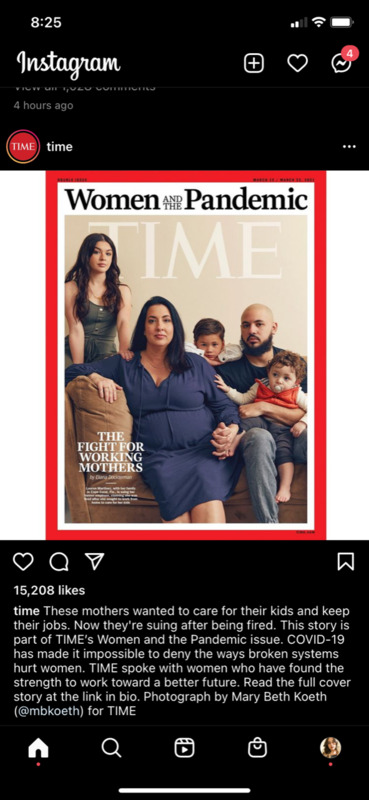 2021-03-04
2021-03-04Women and the Pandemic
"These mothers wanted to care for their kids and keep their jobs. Now they're suing after being fired. This story is part of TIME's Women and the Pandemic issue. COVID-19 has made it impossible to deny the ways broken systems hurt women. TIME spoke with women who have found the strength to work toward a better future. Read the full cover story at the link in bio. Photograph by Mary Beth Koeth (@mbkoeth) for TIME. -
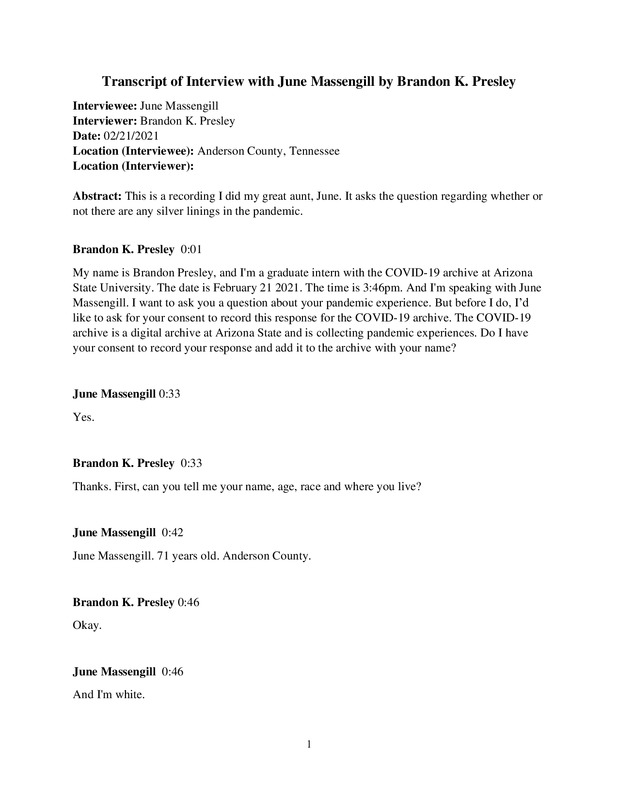 02/21/2021
02/21/2021June Massengill Oral History, 2021/02/21
This is a recording I did my great aunt, June. It asks the question regarding whether or not there are any silver linings in the pandemic. -
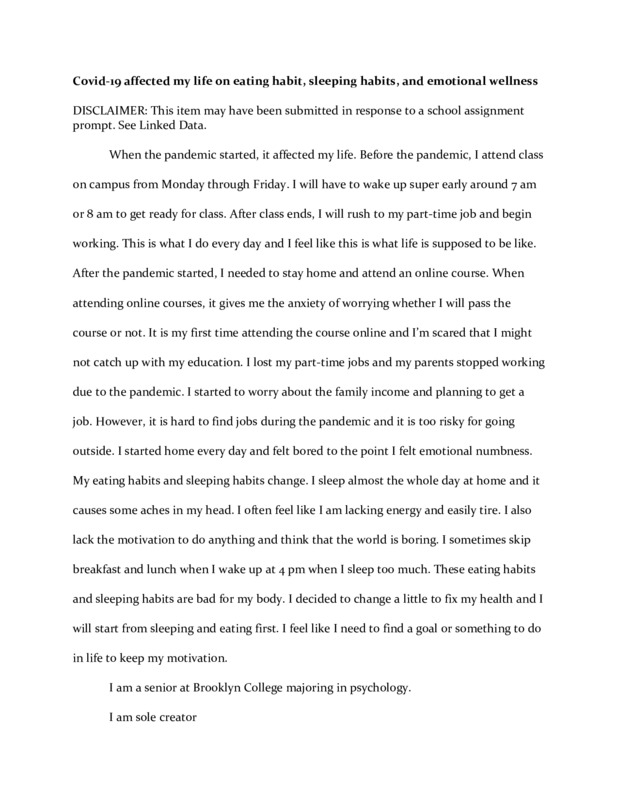 2020-03-24
2020-03-24Covid-19 affected my life on eating habit, sleeping habits, and emotional wellness
When the pandemic started, it affected my life. Before the pandemic, I attend class on campus from Monday through Friday. I will have to wake up super early around 7 am or 8 am to get ready for class. After class ends, I will rush to my part-time job and begin working. This is what I do every day and I feel like this is what life is supposed to be like. After the pandemic started, I needed to stay home and attend an online course. When attending online courses, it gives me the anxiety of worrying whether I will pass the course or not. It is my first time attending the course online and I’m scared that I might not catch up with my education. I lost my part-time jobs and my parents stopped working due to the pandemic. I started to worry about the family income and planning to get a job. However, it is hard to find jobs during the pandemic and it is too risky for going outside. I started home every day and felt bored to the point I felt emotional numbness. My eating habits and sleeping habits change. I sleep almost the whole day at home and it causes some aches in my head. I often feel like I am lacking energy and easily tire. I also lack the motivation to do anything and think that the world is boring. I sometimes skip breakfast and lunch when I wake up at 4 pm when I sleep too much. These eating habits and sleeping habits are bad for my body. I decided to change a little to fix my health and I will start from sleeping and eating first. I feel like I need to find a goal or something to do in life to keep my motivation. -
2020-03-13
The Covid 19 College Experience : Procrastinators version
My experience with Covid has been positive health wise. Mentally I feel the need to interact with my peers because that is what I enjoy doing in my free time other than sleeping. I thought I would be building memorable college relationships, talking to lifelong friends but it seems impossible and that saddens me. This pandemic has showed my how financially irresponsible I am! I have spent so much money on nonsense and now that I realized that, I see all the life altering things I could have done with it, but let's not focus on the negative. It isn't to late for change so all those things can still be achieved. -
 2020-01-11
2020-01-11Silent Bells & Quiet Halls: An Auditory Experience of the COVID-19 Pandemic
In almost every aspect of life, COVID-19 has put the world on mute. From canceled weddings and downsized gatherings to remote workspaces and quiet homes left behind by those we have lost, the overwhelming soundtrack of the pandemic is silence. When K-12 students in the United States transitioned to distance learning nearly 10 months ago, elementary, middle, and high school campuses were abandoned, leaving bells silenced and hallways quiet. From March to November, this silence came to define my work at Princeton Joint Unified School District in the rural town of Princeton, California. No longer did bells ring to mark the end of one period and the beginning of another, lockers no longer slammed shut as students rushed to gather their belongings, and students could no longer be heard gossiping, laughing, and playing during morning break. While this silence initially felt like summer vacation had merely arrived a few months early, the lack of auditory stimulation began to diminish morale and decrease productivity as work felt further removed from the students themselves, transforming human beings into pieces of data and names on a paper. I could often go an entire eight-hour shift without speaking to another person, frequently finding my voice raspy when I would pick up the phone for the first time in hours. Even among coworkers, passing conversations vanished and became simple one-line emails dealing only with the business at hand. As Zoom calls replaced in-person staff meetings and participants remained on mute, the noisy world in which I once worked fell even further away. When in-person learning became optional in November, the sound slowly began to return, but it had changed from what it once was. Growing accustomed to the silence over the long summer, I often found myself jolted in surprise at each unexpected bell or sound of students on the playground. The number of students has drastically lowered since we first closed in March, as many opt to remain home to avoid possible exposure, while lunchtimes are now staggered, and breaks are shortened to prevent spread, creating ominously quiet and often uncomfortable atmospheres. The unease and discomfort heard in students' softened voices displays that widespread uncertainty that has permeated every corner of society. It is my greatest hope that schools will return to "normal" for the 2021-2022 school year and that the sounds of carefree students once more fill the hallways and classrooms of Princeton Joint Unified School District. Silence has become an all-too-painful reality of the COVID-19 pandemic, and I look forward to the day that bells ring on their regular schedule, coworkers are free to converse with one another, and every student returns to campus. In images and articles documenting the pandemic, the overwhelming auditory silence that many of us are experiencing is often lost and forgotten. -
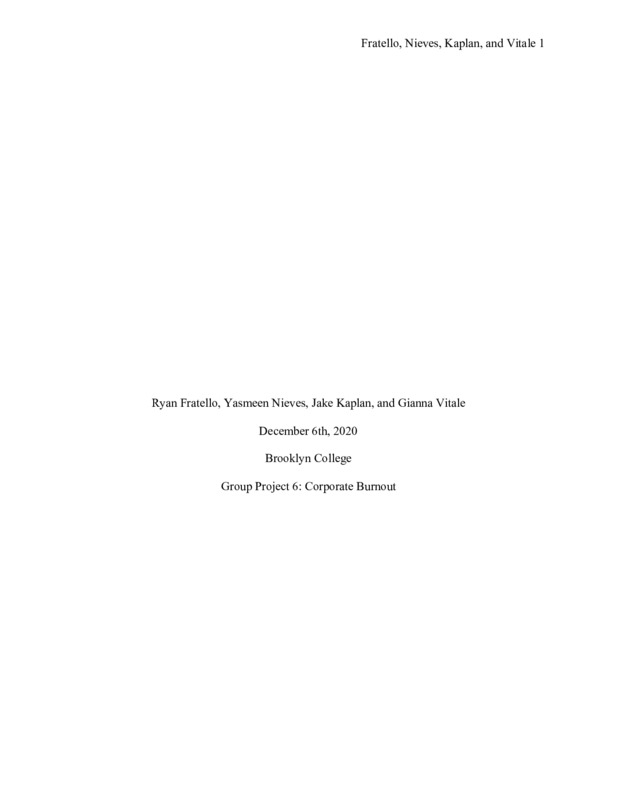 2020-12-10
2020-12-10Burnout: A Sociological Analysis of the 24/7 Work Mentality and Its Impact on the City That Never Sleeps
The item we are submitting is a reflection of society at large, something imperative as we have all been forced to self-reflect on a personal scale during this pandemic. Being forced to recharge and take a breath from the tech-fueled, on-the-go, culture we are entrenched in is a psychological challenge in and of itself. Therefore, starting a conversation as to why work is seen as a means to an end rather than as a self-fulfilling contribution to society and, consequently, something that leads to burnout is a conversation worth having before we enter into a society once again that causes severe stress and anxiety for most people. This is important because we must look at not just our personal lives, but the society we live in so that we can properly address the factors leading to major decline in the mental health of so many, as well as whether or not we want to re-commit to such a society once life returns to some sense of normalcy. -
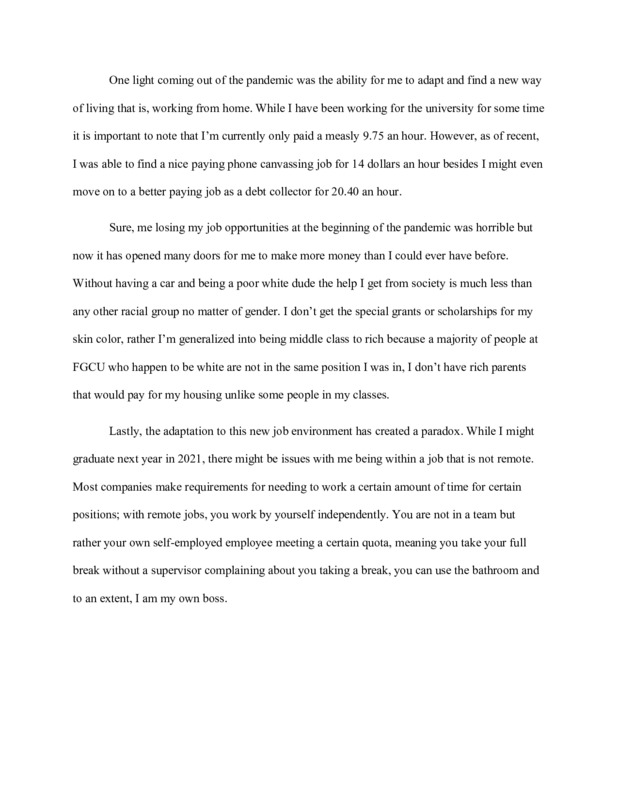 2020-12-01
2020-12-01At home work during the Pandemic
Adaptation to the work enviroment -
2020-11-25
Working and Living in a Pandemic
I think one of biggest impacts of COVID for me has been wondering if, or when, someone close to me will contract the virus. A fear that at times can be intense or foreboding, and at other times, that fades into feeling ‘normal.’ It was several months into the pandemic before I knew of anyone who knew someone that was ill. More recently a couple of family members had very serious cases of the illness, and a couple more that tested positive but had no symptoms. Being vigilant, following safety procedures such as masks and hand sanitizer have finally become normal as well. Early days I found myself nearly obsessed with reading the news, watching the daily press conferences, and looking up the statistics. These activities have reduced to a daily glance or two to look at numbers or read the latest about the vaccination. I worry about my family. I wonder sometimes if I feel even slightly ill or off if ‘this is it’— have I finally contracted it? And then worry about giving it to others. Another way that I have felt the impact has been in the work environment. I work remotely in the technical sector, and have for several years, so at the beginning of the pandemic there were no adjustments in my routine. However, it didn’t take long to see the impacts of the virus on my clients. Impacts that were not prepared for even with disaster recovery, risk management or continuity planning. The financial impacts businesses affected their ability to ensure employees could work from home. That their employees would have the correct equipment, connectivity, could adapt to the necessary behavioral changes that can disrupt productivity, etc. How now can we receive, prepare and ship equipment, when no one can be in an office to receive anything? The changes have especially impacted efforts to bring on new employees. One thing that I found striking was the requirements in security and access to data when moving from a secure network environment, to set up for the same security at home. A majority of my teams live in countries outside of the United States where some don’t have internet in their homes, let alone being set up to manage Personal Private Information (PPI). My clients in financial sectors have stringent background checks that can take several weeks to clear in the “old world” under normal conditions. With agencies closed and workforce reduced, it is taking two to three times longer to get simple things accomplished. The last major impact I have felt during the shift to my sector becoming a “working from home one,” was experiencing people on the other end of ZOOM, as we all had to overcome our fears about interruptions. Children crying, wanting attention because they don’t understand why mom and dad are home but can’t pay attention to them. Dogs barking, doorbells ringing, calls dropping. It took several months to work out many of the kinks, and for everyone to adjust to these interruptions, but being OK with them. Overall, I would say that I am not directly impacted too much for the moment. Most of the adjustments that have been made and are now normal feeling. Things are finally feeling like they are back to business as usual, I suppose. On a personal level, my fears rise and wain, and each day is different. I am leery of vaccinations, and wonder if the “wonder cure” we’ve been promised will be miraculous, or if more difficulties will follow? The verdict is not out on that yet, so we will have to wait and see what our next ”new normal” will really look like. -
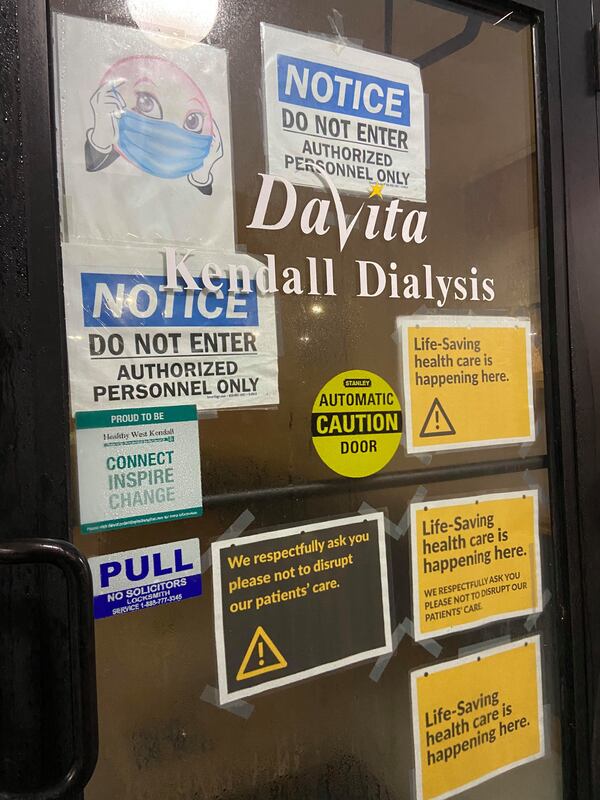 2020-11-14
2020-11-14Tatiana's Work Enviroment
Tatiana works at Davita Dialysis in the Miami, Florida area. Her work experience has been immeasurably altered due to Covid-19. Walking in to work everyday feels very different for her with all of the warnings and no visitations allowed. -
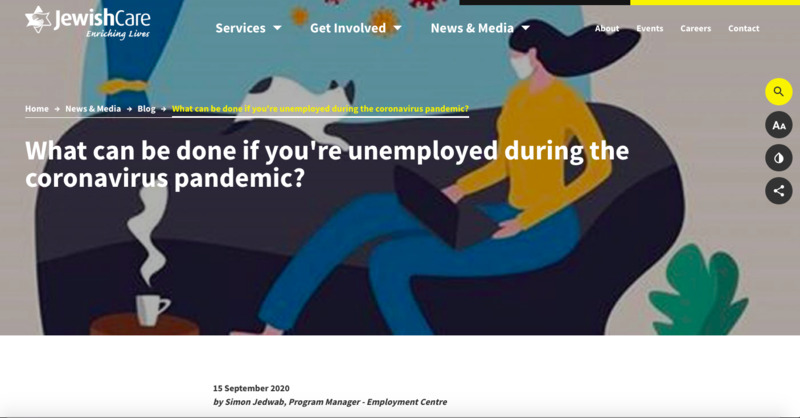 2020-09-15
2020-09-15Jewish Melbourne: Jewish Care blog post - 'what can be done if you're unemployed during coronavirus'
An article by Simon Jedwab, Program Manager - Employment Centre, providing advice and support for people who are unemployed during the pandemic -
 11/16/2020
11/16/2020Anonymous Active Air Force Reservist Oral History, 2020/11/16
This is a audio interview with a active Air Force Reservist, describing how the Covid pandemic has impacted his work environment and personal livelihood. -
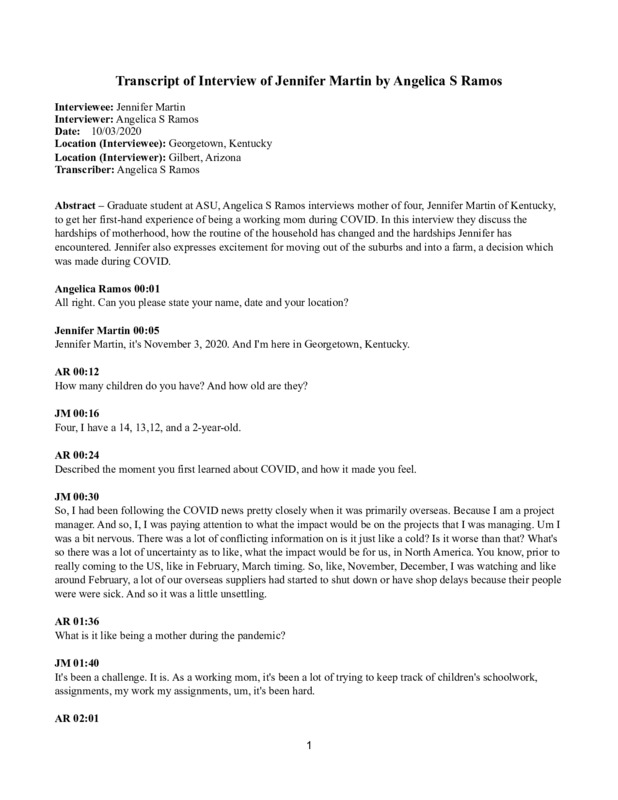 2020-10-03
2020-10-03Jennifer Martin Oral History, October 3, 2020
Graduate student at ASU, Angelica S Ramos interviews mother of four, Jennifer Martin of Kentucky, to get her first-hand experience of being a working mom during COVID. In this interview, they discuss the hardships of motherhood, how the routine of the household has changed and the hardships Jennifer has encountered. Jennifer also expresses excitement for moving out of the suburbs and into a farm, a decision which was made during COVID. -
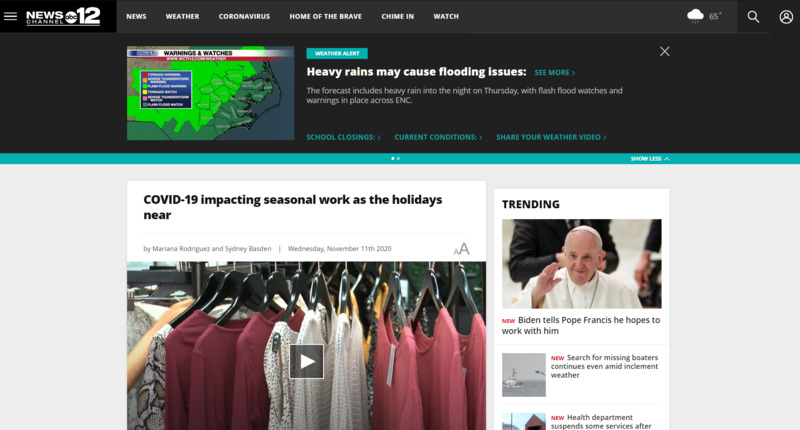 2020-11-11
2020-11-11COVID-19 impacting seasonal work as the holidays near
As the holidays approach, many people are looking for seasonal work. However, stores are hiring fewer or no seasonal workers because of increased online shopping due to COVID-19. -
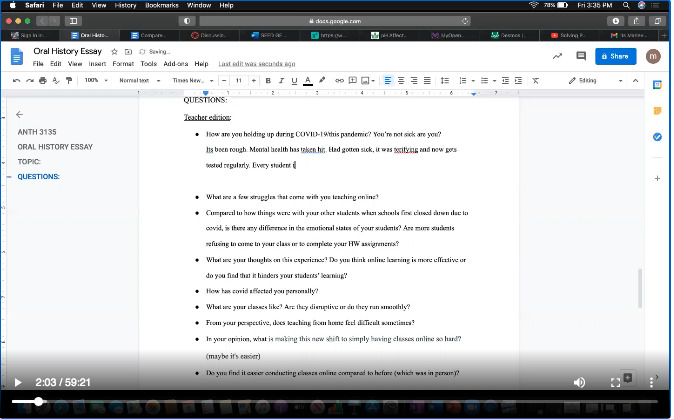 2020-11-06
2020-11-06The Effects of Covid-19 on both a student and teacher
In this video, I interview a former high school teacher of mine and I ask her questions about experiences she's had while battling this pandemic. I believe she's also attending Brooklyn College Graduate (Law) school.
